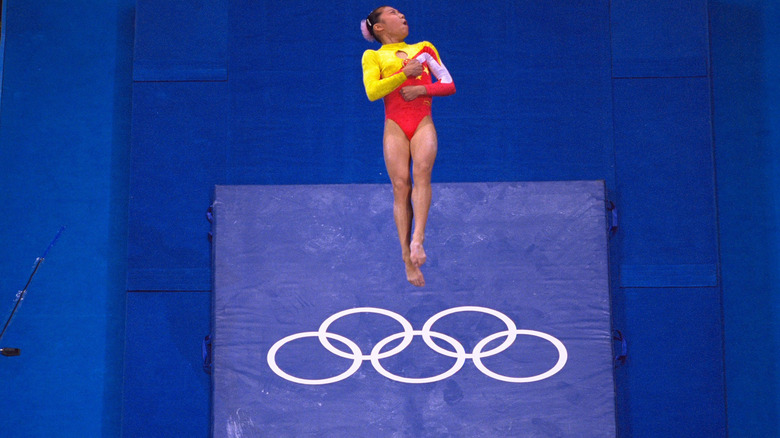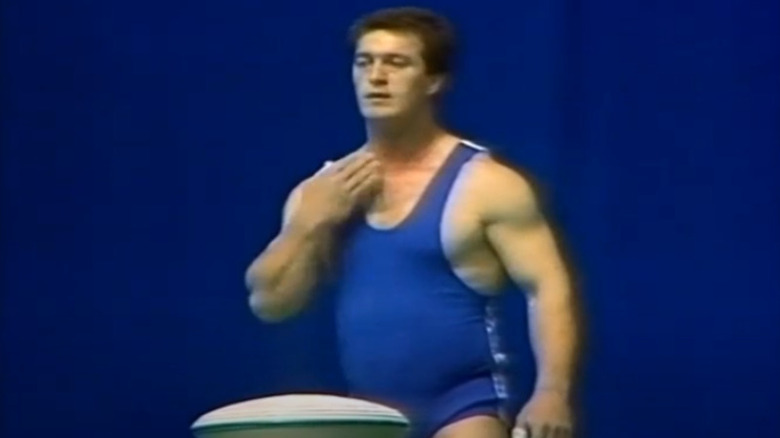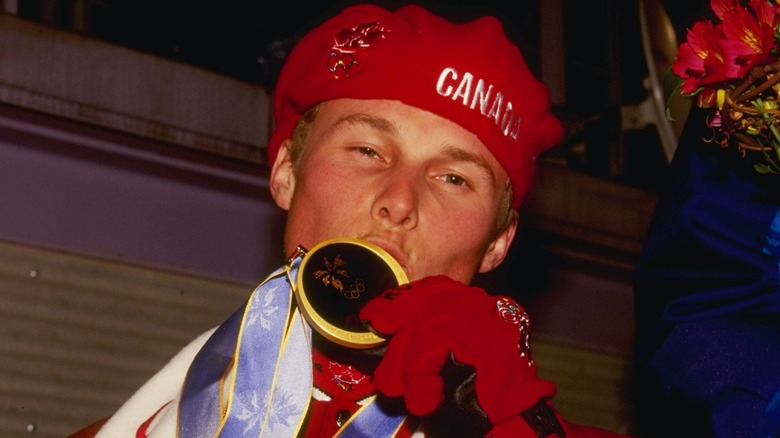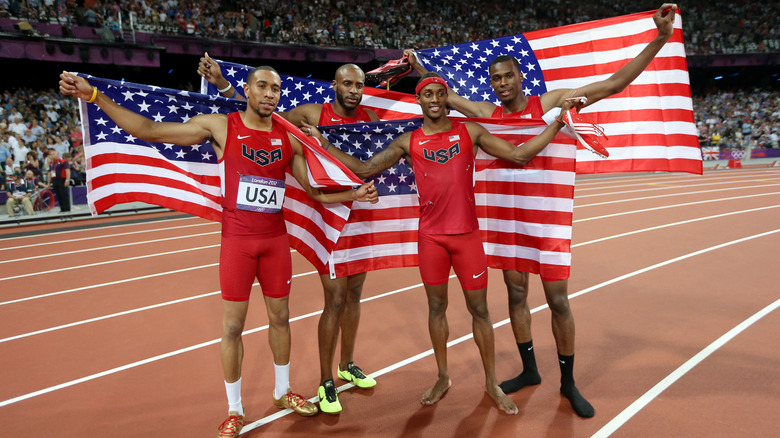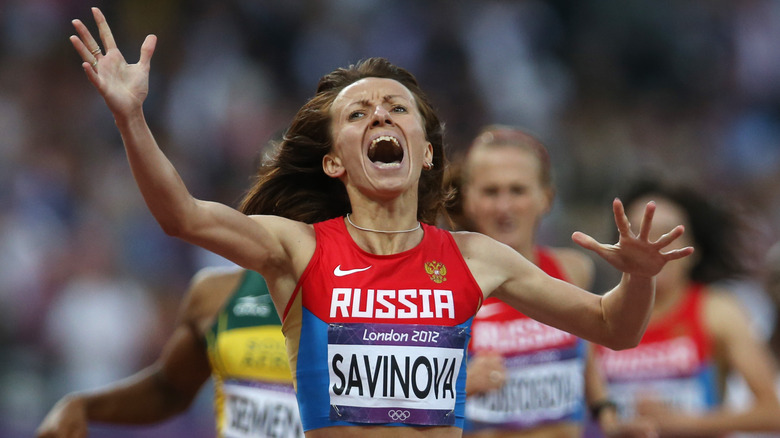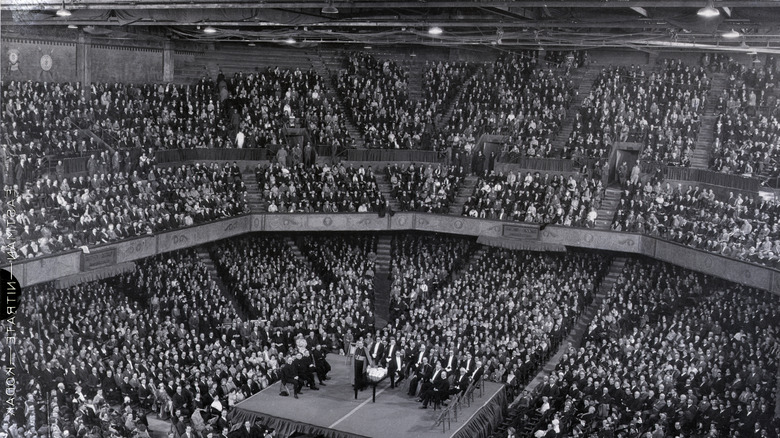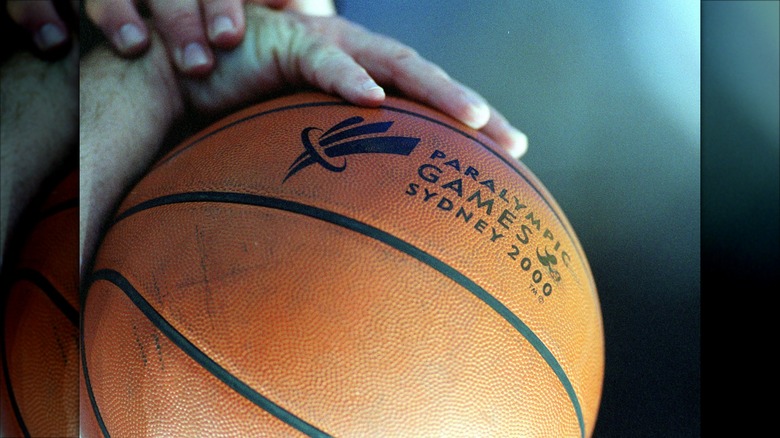10 Times Olympic Athletes Had Their Medals Taken Away
For elite athletes, getting a chance to compete at the Olympic Games is often the pinnacle of their career. Some may reach this glorious height just once, while others make it to multiple games and earn medal after medal (looking at you, Simone Biles and Michael Phelps). It goes without saying that getting to this point takes a lot of work and years of training. What's more there are strict rules Olympic athletes are expected to follow to make sure their conduct is fair. While some errors can earn athletes nothing more than a figurative slap on the wrist, there are other infractions that have serious consequences. Every now and then, a scandal arises that proves even top-tier athletes make mistakes that can totally derail their careers.
There have been several instances over the years of sportspeople making it to the Olympic podium, only for their medals to be taken back when something unsavory comes to light. Sometimes, it can take years for the truth to be revealed, but in other cases, it's almost instantaneous.
While there are many Olympic moments that are sure to make you cry tears of joy and feel all sorts of inspired, there are also a number of Olympic stories that don't exactly lift the spirits. From notorious doping scandals to supremely bad sportsmanship and beyond, here are 10 times Olympic athletes lost the medals they spent lives working for.
Lance Armstrong's doping cost him bronze
Lance Armstrong's incredible rise to the top of his game as one of the best cyclists in the world was a sight to behold in the '90s. For a time, he was one of America's greatest jewels, winning multiple competitions, including the prestigious Tour de France several times. He was to cycling what Simone Biles is to gymnastics: the absolute GOAT. Not only did he raise the bar race after race, but he was a seemingly wholesome figure who was supposed to be a great model for aspiring athletes and beyond. Armstrong even became an inspiration for those living with cancer after he was diagnosed with the disease in 1996. His comeback was the stuff of legend, and in 2000, he won the bronze medal at the Sydney Olympics. No one could've predicted what came next.
Years after his win, speculation began to arise that Armstrong had earned many of his greatest achievements by systematically doping over the years. He denied the allegations for years, but in 2013, he finally came clean. At the time, the 41-year-old sat down with Oprah Winfrey to explain that he "lost himself" in his own impressive comeback story and admitted to being a bully by calling whistleblowers liars.
The admission soon resulted in one of the biggest scandals in sports history, with Armstrong stripped of any medals he won after 1998, including his seven Tour de France wins and his Sydney Olympic bronze medal.
Dong Fangxiao didn't meet the age requirements
There are many strict rules Olympic gymnasts are not allowed to break, and rightly so. It's a highly complex sport and an art form that requires serious dedication, confidence, and technical ability. What's more, it takes an incredible toll on the body, with many gymnasts training since early childhood to have the confidence to pull off gravity-defying stunts. To compete as a gymnast at the Olympic Games, athletes have to be over 16 years of age. However, for a long time, the minimum age was 14 years old, rising to 15 in 1981. Back then, it was considered a sport for young teens, and it would've been largely unthinkable that someone in their late 20s would compete.
The rules were largely changed to make sure too much pressure wasn't being placed on young athletes and to keep up with the evolution of harder skills, which can require more developed bodies to pull off. For the Sydney Olympics in 2000, China's gymnastics team would have been well aware of the regulations and that no one on the team should have been underage. Their team, which Dong Fangxiao, performed so well that they won a team bronze medal.
All seemed kosher until 2010 when it was revealed that Fangxiao was only 14 at the time of the competition, making her involvement against the rules. China was subsequently stripped of its achievement and the medal was handed over to Team USA.
Marion Jones lost five medals in the wake of her doping scandal
Olympic track star Marion Jones was just 12 years old when she started competing at an international level and by 2000, she was running at the Sydney Olympics. Jones won five medals in total, including a gold in the 100 and 200 meters, making history as the first woman to do so. Her talent was breathtaking, and Jones couldn't have been flying any higher.
Less than a decade after she made Olympic history, Jones' legacy took a major hit. Much like Lance Armstrong, Jones had been plagued with rumors of doping for a while. In 2007, she finally came clean about her steroid use. As a result, the International Olympic Committee stripped Jones of all of her medals and banned her from competing in any future Olympic Games. Jones was also sentenced to six months in prison because she lied to U.S. federal prosecutors about her steroid use. After she received her sentencing in 2008, the president of USA Track & Field, Bill Roe, stated (via The Guardian), "The revelation that one of the sport's biggest stars took performance-enhancing drugs and repeatedly lied about it, in addition to being a party to fraud, has no silver lining."
Years later, Jones sat down with "Oprah: Where Are They Now?" to reflect on her experience and how crucial it was that she apologized to the people in her life who were impacted by her drug use. "And then secondly, you have to begin the long, long road of forgiving yourself," she added.
Ibragim Samadov's bad sportsmanship cost him big
No one would deny that becoming an Olympic athlete is an incredibly difficult achievement. Not only do you have to get yourself in peak physical condition, but you have to make sure that you stay mentally focused on the goal at hand. On top of all that, if you turn in a bad performance or don't get to where you want to be, you are still expected to be a good sport and take your place graciously. Unfortunately for Russian weightlifter Ibragim Samadov in 1992, he didn't quite get the memo.
The Summer Games were held in Barcelona that year, and Samadov arguably turned in a great performance worthy of the podium, scooping bronze for his efforts. However, rather than accept his achievement, Samadov appeared incensed. Once presented with his medal, he snatched it and chucked it to the ground. Then, he exited the podium before the medal ceremony could even officially begin. To say the International Olympic Committee was annoyed is an understatement.
"The athlete grabbed the medal from the hands of Mr. Filaretos, the IOC member assigned to the presentation. The athlete threw the medal to the ground and left," the IOC communique said, as reported by UPI. The IOC blasted Samadov's behavior as "contrary to all forms of sporting ethics" and swiftly took the medal back. As for Samadov, he told a Russian news outlet that he was "unwell" and recalled nothing about the incident.
The Fanny Smith and Daniela Maier scandal
The Summer Olympics aren't the only Games that've hosted athletes who've gone on to have their medals revoked. Every four years, the Winter Olympic Games give sports fans a chance to cheer on snowy sports such as snowboarding, bobsledding, figure skating, and skiing. And every once in a while, a Winter Olympian lands in hot water. In 2022, Swiss skier Fanny Smith and German skier Daniela Maier found themselves at the center of one of the greatest medal rows in recent years. Both of the talented sports stars were competing in the ski-cross when Smith whizzed past Maier, knocking her off balance as she did so and storming into third place.
Smith thought she had won the medal, but the judges requested a review and ultimately decided to effectively disqualify her, shunting her back to last place and paving the way for Maier to take to the podium to claim bronze. According to Yahoo! Sport, Smith was furious and reportedly yelled, "This is a joke! This wasn't on purpose! My ski was on the edge. Does this judge know how to ski? They have no idea!"
The judges believed that Smith had purposely side-kicked Maier, but Smith and her team labeled it a total misunderstanding. Amazingly, Smith appealed and was awarded the bronze medal 10 months later. In an emotional tale of ups and downs, Maier was also allowed to keep her bronze medal.
Ross Rebagliati's cannabis trouble
Back in the '90s, Canadian snowboarder Rob Rebagliati was at his peak. In 1998, he competed at the Nagano Olympics, winning a gold medal for his efforts. However, Rebagliati's elation was relatively short-lived when the decision was made to strip him of the accolade in February of the same year. The International Olympic Committee found that he had tested positive for marijuana, though Rebagliati denied it.
Carol-Anne Letheren of The Canadian Olympic Association said at the time (via The Washington Post): "The COA has met with Ross, and we were informed that the last time he used marijuana was April of 1997. Ross claims that the traces of marijuana in his system are due to the significant amount of time he spends in an environment with marijuana users." Regaliati maintained that the marijuana was in his bloodstream because of a party he attended just before going away to the Olympics, as other people were using it around him. He was understandably devastated and despite appealing, never regained his medal.
Years later, Regaliati would launch his own cannabis company called Ross' Gold. "I actually had the idea when I was being held in the Nagano police station," he told CBC News in 2023. "I am going to fight for this plant for the rest of my life, start a cannabis company and show everybody what cannabis is really all about."
The entire US men's relay team lost their medals
When working as a team at an Olympic event, there is a certain level of trust that has to be maintained. If one person messes up, then it can impact all of the athletes unfairly. The 2012 Team USA men's relay team found this out the hard way after they came second to Jamaica in the Olympics, taking home the silver medal. Team members Trell Kimmons, Justin Gatlin, Ryan Bailey, and Tyson Gay were overjoyed with their achievement, but it wasn't to be.
In 2015, news broke that Gay was found to have doped during the London games. He first failed drug tests in the summer of 2013 but first used the prohibited substance back in July 2012, three weeks before hitting the track at the Olympics. As a result of his transgressions, the team was stripped of their silver medal. Despite being caught out, Gay was adamant that he shouldn't be labeled a cheat, despite receiving a one-year ban.
"When you put key words or a syringe by somebody's name, it manipulates someone's mind to believe you intentionally tried to do something and get away with it," Gay told the BBC after making his return. "That wasn't the case." He went on to say that he put his trust in his coach, Jon Drummond, who received an eight-year ban for doping.
Mariya Savinova was stripped of gold after an investigation
Some Olympic athletes live insanely lavish lives after their phenomenal wins, but others have to live with the consequences of their bad decisions instead. Unfortunately for Russian sprinter Mariya Savinova, she falls into the latter category. She dominated in the London 2012 800m race, coming in first place and taking the gold medal, shouting in excitement as she crossed the finish line. Savinova was first suspended in 2013 after she admitted to doping on tape. The incriminated footage was recorded by fellow runner Yuliya Stepanova, and it ultimately led to the investigation of Savinova and four other Russian athletes. The results of the investigation didn't come to fruition until 2017, when Savinova was found to have been using steroids from 2010 to 2013.
The Court of Arbitration for Sport released a statement that read, "As a consequence, a four-year period of ineligibility, beginning on 24 August 2015, has been imposed, and all results achieved between 26 July 2010 and 19 August 2013, are disqualified and any prizes, medals, prize and appearance money forfeited." Savinova was also given a four-year ban but appealed the decision to no avail.
Boxer Jack Egan lost his medal after his name was called into question
If you thought Olympic rule-breakers were a relatively modern phenomenon, then think again. Back in 1904, the Olympic Games looked a little different. While the 2024 Olympic Games opening ceremony featured stars like Kelly Clarkson and Céline Dion, the event wasn't exactly as grand or packed with A-listers in the 1900s. Even so, it was still a masterclass in athleticism, and there were rules that had to be adhered to — if you wanted to keep your medal, that is.
American boxer Jack Egan competed in the St. Louis Olympics that year, fighting his way into third place alongside Irish boxer Joe Lydon. A tie isn't anyone's desired outcome, but it turned out that Egan shouldn't have been fighting at all. The following year, it was discovered that Egan was actually called Frank Joseph Floyd. As far as sportsmanship and conduct rules go, this one doesn't seem like too big of a deal, right? Well, according to the Amateur Athletic Union rules, athletes were not allowed to compete under a different name.
As the Evening Star reported back in 1905, the AAU brought down the hammer in a big way: Egan's bronze medal was swiftly revoked, and the AAU no longer let him compete. It's unclear as to why he changed his name.
Spain's Paralympic basketball team falsified their disabilities
The following story is so mind-blowing and crass that it almost defies belief. At the Sydney Paralympic Games in 2000, Team Spain had a strong showing in the intellectually disabled basketball category. The squad made it all the way to the top, winning gold. However, their medal was taken away after a reporter blew the whistle on what was going on behind the scenes.
Carlos Ribagorda was an undercover journalist who spent two years on the team ahead of the 2000 Paralympics. Members of the team were to be tested for intellectual disabilities, but according to The Telegraph, Ribagorda found that the athletes' intellectual abilities were never checked. According to the Spanish magazine Gigandes, ten members of the team apparently had no handicap at all. The athletes were stripped of their medals as a consequence of the findings, and Fernando Martin Vicente of the Spanish Federation for Mentally Handicapped Sports was found guilty of fraud.
As if this story wasn't upsetting enough, the Paralympics did not permit athletes with intellectual disabilities to compete at the 2004 or 2008 Games as result of Team Spain's actions. In 2009, the IPC voted to welcome athletes with intellectual disabilities back to the competition. Per the BBC, Bob Price of the International Sports Federation for Persons with an Intellectual Disability said at the time, "This resolution brings this unfortunate episode to an end and reintroduces intellectual disability athletes to their proper place within the Paralympic family."


